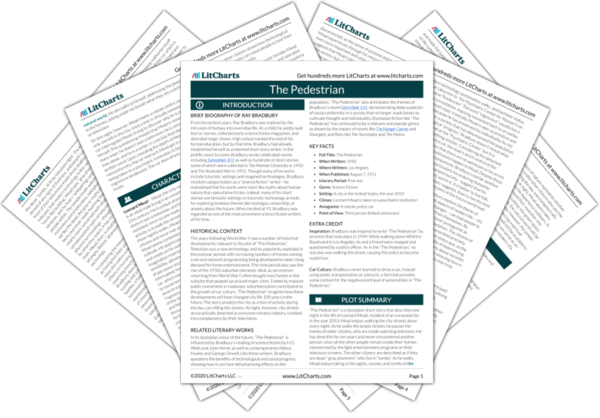Leonard Mead Quotes in The Pedestrian
To enter out into that silence that was the city at eight o'clock of a misty evening in November, to put your feet upon that buckling concrete walk, to step over grassy seams and make your way, hands in pockets, through the silences, that was what Mr. Leonard Mead most dearly loved to do.
[O]n his way he would see the cottages and homes with their dark windows, and it was not unequal to walking through a graveyard where only the faintest glimmers of firefly light appeared in flickers behind the windows. Sudden gray phantoms seemed to manifest upon inner room walls… or there were whisperings and murmurs where a window in a tomb-like building was still open.
If he closed his eyes and stood very still, frozen, he could imagine himself upon the center of a plain, a wintry, windless Arizona desert with no house in a thousand miles, and only dry river beds, the streets, for company.
“What's up tonight on Channel 4, Channel 7, Channel 9? Where are the cowboys rushing, and do I see the United States Cavalry over the next hill to the rescue?...What is it now?” he asked the houses… “Eight-thirty P.M.? Time for a dozen assorted murders? A quiz? A revue? A comedian falling off the stage?”
“What are you doing out?”
“Walking,” said Leonard Mead. “Walking!”
“Just walking,” he said simply, but his face felt cold.
“Walking, just walking, walking?” “Yes, sir.”
“Walking where? For what?”
“Walking for air. Walking to see.”
“Your address!”
“Where are you taking me?”
The car hesitated, or rather gave a faint whirring click, as if information, somewhere, was dropping card by punch-slotted card under electric eyes. “To the Psychiatric Center for Research on Regressive Tendencies.”

Leonard Mead Quotes in The Pedestrian
To enter out into that silence that was the city at eight o'clock of a misty evening in November, to put your feet upon that buckling concrete walk, to step over grassy seams and make your way, hands in pockets, through the silences, that was what Mr. Leonard Mead most dearly loved to do.
[O]n his way he would see the cottages and homes with their dark windows, and it was not unequal to walking through a graveyard where only the faintest glimmers of firefly light appeared in flickers behind the windows. Sudden gray phantoms seemed to manifest upon inner room walls… or there were whisperings and murmurs where a window in a tomb-like building was still open.
If he closed his eyes and stood very still, frozen, he could imagine himself upon the center of a plain, a wintry, windless Arizona desert with no house in a thousand miles, and only dry river beds, the streets, for company.
“What's up tonight on Channel 4, Channel 7, Channel 9? Where are the cowboys rushing, and do I see the United States Cavalry over the next hill to the rescue?...What is it now?” he asked the houses… “Eight-thirty P.M.? Time for a dozen assorted murders? A quiz? A revue? A comedian falling off the stage?”
“What are you doing out?”
“Walking,” said Leonard Mead. “Walking!”
“Just walking,” he said simply, but his face felt cold.
“Walking, just walking, walking?” “Yes, sir.”
“Walking where? For what?”
“Walking for air. Walking to see.”
“Your address!”
“Where are you taking me?”
The car hesitated, or rather gave a faint whirring click, as if information, somewhere, was dropping card by punch-slotted card under electric eyes. “To the Psychiatric Center for Research on Regressive Tendencies.”











